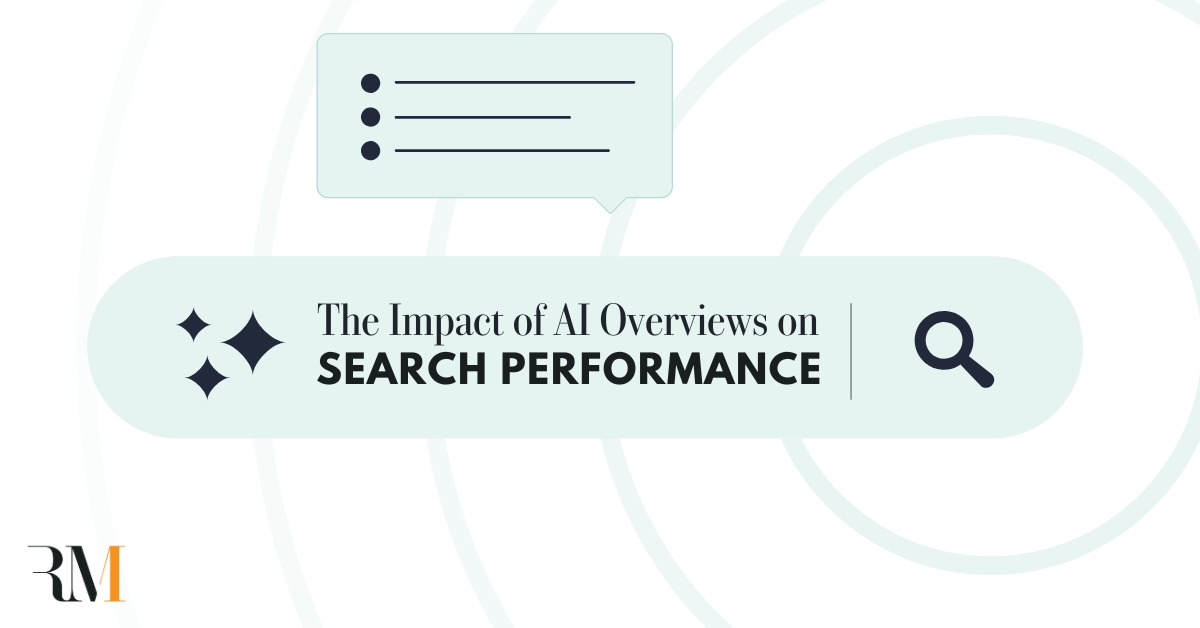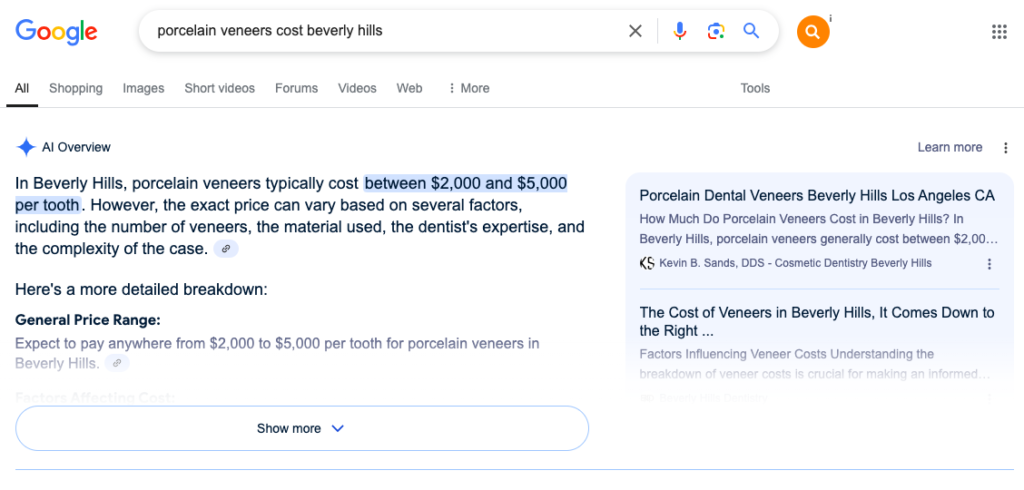The Impact of AI Overviews on Search Performance

Search behavior is evolving – again! Just as we’ve started getting a handle on featured snippets and zero-click searches, Google’s AI Overviews have entered the chat.
Formerly known as the Search Generative Experience (SGE), AI Overviews are AI-generated summaries that appear at the top of certain search results, often answering a user’s question directly with information pulled from multiple online sources. While they can improve user experience by streamlining information discovery, they’re also changing how search performance is measured, leading many elective healthcare professionals to ask: “Why are my impressions going up, but clicks are going down?”
Let’s break down what’s happening and how it may affect your digital strategy.
AI Overviews and the Rise of “Zero-Click” Searches
We’ve talked before about zero-click searches, where Google provides the answer to a query directly on the results page. This allows searchers to get the information they need without ever clicking through to a website.
In short, AI Overviews take the groundbreaking concept of zero-click searches even further. Instead of pulling a direct answer from a single site, AI Overviews aggregate content from multiple web pages and repackage it into a conversational, summary-style response. This is especially common for informational searches, such as:
- “How much does liposuction cost?”
- “What’s the difference between porcelain veneers and dental bonding?”
- “What is a mommy makeover?”

Impressions Are Up, Clicks Are Down – Here’s Why
In the realm of medical and dental digital marketing, we’ve seen a recent increase in search impressions paired with a decline in clicks. In fact, clicks to the top-ranking page dropped by 34.5%, according to a recent Ahrefs study.1 This drop in clicks doesn’t necessarily mean your visibility is down, though. AI Overviews frequently count as an impression when your site is cited in the summary, even if no one actually visits your page. If your site is cited in the AI Overview and also ranks in the organic results or another SERP feature, that creates the opportunity for multiple impressions as well.
Interestingly, the sites Google links to in its overviews aren’t always the ones ranking in the top 10 results. As Search Engine Land reports, 82.5% of these citations come from deeper pages — content that might not otherwise appear on page one of search results.2
This means that ranking alone doesn’t determine visibility in AI Overviews. Rather, Google is looking at the relevance and context of your content to the query, not just its position in the SERPs.
What Should Elective Healthcare Practices Do About AI Overviews?
Here are a few strategies we recommend for adapting to this new landscape:
- Focus on relevance over ranking. Instead of just chasing page-one rankings, make sure your content is actually answering common patient questions in a clear, digestible way.
- Structure your content for clarity. Use headers, bullet points, and concise language to help Google and AI systems understand and parse your content.
- Keep investing in local SEO. For searches likely to lead to new patient inquiries, like “facelift surgeon near me” or “emergency dentist San Diego,” traditional local search engine optimization is still crucial.
What About ChatGPT and Other AI Tools?
Although Google still reigns as the dominant search engine, tools like ChatGPT are beginning to carve out a role in how people search for and process information. Whether it’s asking for procedure costs, treatment comparisons, or even getting sample questions to ask during a consultation, users are leaning into AI for quick answers.
The upside? Many of these AI tools are sourcing from Google itself or scraping public pages, so high-quality, well-optimized content still matters. The key is to make sure your website speaks clearly to the questions your potential patients are asking.
Final Thoughts
AI Overviews are changing how information is delivered and how users interact with it. They may lead to fewer clicks for certain queries, but they also present new opportunities for visibility (provided your content is relevant, trustworthy, and well-structured).
Need help optimizing your practice’s website for this new search experience? Our team at Rosemont Media can help you stay ahead of the curve. Contact our digital marketing experts to get started!
References
1 Ahrefs: AI Overviews Reduce Clicks by 34.5%
2 Search Engine Land: 82% of Google AI Overviews citations come from deep pages: Report